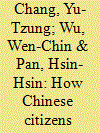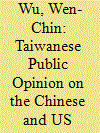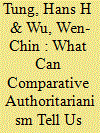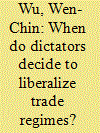| Srl | Item |
| 1 |
ID:
153411


|
|
|
|
|
| Summary/Abstract |
While many studies have investigated Taiwanese people’s attitudes towards cross-Strait relations, few studies explore how Chinese people on the other side of the Taiwan Strait perceive the Taiwan issue. Using data collected via a telephone survey that covers 2,000 respondents from ten major cities in China in 2013, this article presents empirical evidence to fill this gap. It finds that most Chinese citizens’ attitudes are aligned with the government’s propaganda on cross-Strait relations. In particular, Chinese citizens have inaccurate perceptions of Taiwanese support for reunification with China. This article also finds that when Chinese respondents think that the city in which they live is more economically advanced than Taipei, the capital of Taiwan, they would support: (1) a faster pace towards a resolution, and (2) the use of military force to resolve cross-Strait confrontations. These findings offer new perspectives on studies of cross-Strait relations and Chinese nationalism.
|
|
|
|
|
|
|
|
|
|
|
|
|
|
|
|
| 2 |
ID:
193222


|
|
|
|
|
| Summary/Abstract |
Since 2016, China has been conducting military flybys around Taiwan, while the US has approved arms sales to Taiwan on several occasions and sent warplanes and battleships through the Taiwan Strait. How does Taiwanese public opinion respond to the Chinese and US military presence in the Strait? Is the public likely to become less supportive of de jure independence for Taiwan on account of China's military deterrence or more supportive owing to a perceived likelihood of US military assistance? In this report, we provide answers to these questions based on evidence from a survey experiment conducted in Taiwan in October–November 2020. We find that Taiwanese are less sensitive to the Chinese military presence in the Taiwan Strait but have become more supportive of de jure independence after seeing the US aircraft in the area. Our findings contribute to studies of cross-Strait relations and US foreign policy on the Taiwan Strait.
|
|
|
|
|
|
|
|
|
|
|
|
|
|
|
|
| 3 |
ID:
183632


|
|
|
|
|
| Summary/Abstract |
This paper evaluates the progress and impact of the literature on comparative authoritarianism, showing not only how its development over the previous two decades can help us understand China’s authoritarian politics better, but also how the latter can move the former forward. We focus on two important topic areas in the literature: authoritarian power-sharing and autocratic politics of information (e.g., partial media freedom and government censorship). For the first topic, we shall review the literature on the authoritarian power-sharing between dictators and their allies and explicate how this conceptual innovation helps us understand the institutional foundation of China’s regime stability and phenomenal economic performance before Xi Jinping. The analysis then provides us a baseline for assessing China’s economic and political future under Xi Jinping given his clear departure from the pre-existing power-sharing framework. Finally, this paper also assesses the relevance of the literature on authoritarian politics of information to the Chinese context. In sum, we not only emphasize the conceptual contributions of the literature of comparative authoritarianism to the field of Chinese politics, but also identify lacunae in the current literature and avenues for future research that post-Xi political developments have made visible to us.
|
|
|
|
|
|
|
|
|
|
|
|
|
|
|
|
| 4 |
ID:
146160


|
|
|
|
|
| Summary/Abstract |
This paper investigates how authoritarian leaders employ trade openness as a response to rising inequality. Based on the Heckscher–Ohlin model of international trade and models of democratic transition, I argue that unskilled laborers in authoritarian regimes can benefit from engaging in international trade, thus becoming more compliant to the authoritarian rules as their countries integrate into the world economy. Therefore, dictators in labor-abundant countries expand trade to neutralize democratization threats initiated by rising inequality. My argument uses supporting data from around eighty authoritarian regimes during the period from 1963 to 2003. I address endogeneity problems with dynamic panel data and instrumental variable regression models in this paper. My analyses suggest that economic globalization helps strengthen authoritarian regimes.
|
|
|
|
|
|
|
|
|
|
|
|
|
|
|
|